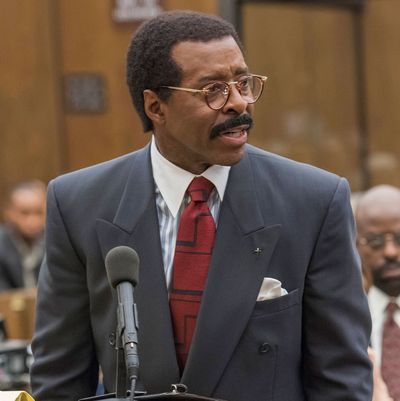
Ryan Murphy’s The People v. O.J. Simpson is over, culminating in an episode that focused on the closing arguments, verdict, and fallout from the end of the trial of the century. One of the most interesting things about the O.J. Simpson trial was how remarkably well-covered it was at the time, with networks regularly devoting large chunks of daytime programming to it and Court TV sprouting up with uncut coverage. Consequently, we can go back and compare a lot of the FX program against video of the actual trial, including last night’s closing arguments, verdict, and that gut-wrenching press conference.
The first thing one learns going over closing argument transcripts and watching video is that they are epic. Writers Scott Alexander and Larry Karaszewski were tasked with distilling arguments that took place over multiple hours and across several days of the trial into monologues that lasted a couple minutes on the program. To do so, they often jumped around in history, taking a bit from an early part of an argument and merging it with something from later (we jump to different points in the videos below to highlight the most pertinent moments). They would also understandably paraphrase, and they cut out most of the meat of the prosecution arguments, which consisted of going over the evidence again piece by detailed piece.
Marcia Clark
It’s interesting to see the real Marcia Clark open her closing argument casually — smiling and talking about how she just wished she could chat with the jurors, especially in light of how deftly Murphy’s program has captured the controversy surrounding the prosecutor’s likability and appearance. (To that end, the show changed her outfit a bit, but it’s similar enough.) To start, the writers took several separate thoughts Clark expressed and merged them into her “thank you” speech. “First, I want to take this opportunity to thank you, and I want to thank you from the bottom of my heart,” and the next few sentiments that follow (including, “You have made a tremendous sacrifice”) are condensed into a TV version that gets across the same idea: “I want you all to know that I appreciate what you’re doing here, for justice, and to thank you all from the bottom of my heart for the incredible sacrifices that you’ve made. Thank you.”
Perhaps the most scathing part of Clark’s closing argument, when she discusses how someone who was once her witness should have never been born, made it to FX relatively word-for-word, even the harsh, sounds-like-TV line of “No such person on the planet.” Yes, Clark really did ask those questions about Mark Fuhrman, and they lead into something similar if not identical to the show’s line about how it “would be a tragedy if O.J. Simpson were not found guilty because of the racist attitude of one officer.”
From here, the show really jumps around, highlighting some evidence that Clark spent hours on, like “the shoeprints at Bundy. Hair from the defendant.” In the trial, Clark pounded the statistical impossibility of O.J. Simpson’s innocence comparing the “1 in 57 billion” likelihood and the “1 in 5 billion people on the planet” and calling it “an identification,” but it didn’t come until over 90 minutes later.
Marcia Clark actually ended her closing, after several rebuttals, with an impassioned plea to remember the domestic violence in the case, not with how O.J. didn’t ask how Nicole died.
Chris Darden
Chris Darden came after Clark and, again, the writers jump around in his closing argument, compressing several sections of it and making up others. In reality, he did speak about O.J.’s fuse (which turned into, “She knew the bomb could go off at any second”) and the fact that the cops had come up there eight times made it into the episode:
If anything, one can see the writers took Darden’s focus — on the evidence of a history of domestic violence between O.J. Simpson and Nicole Brown Simpson — and distilled it. Several times in Darden’s closing, he returned to a phrase about fuses burning, which becomes “The fuse is getting shorter, the anger is building” on TV. Same idea, compressed for time.
He focuses several times on the violence and the rage, saying as he did on TV, “He stabs and he slices and he cuts until that rage is gone.”
He didn’t close with the great line he does on TV, but he did say it: “He was also one of hell of a great football player, but he is still a murderer.”
Johnnie Cochran
You have to love how Murphy captures Johnnie Cochran stomping to his feet to start his closing argument, when the reality is a lot duller. Filled with legal instructions and niceties. Cochran’s closing argument took days, and again, the writers merge a lot of things he said at different points into one speech. It’s amazing to consider how they took one line from deep in his first argument about domestic violence and turned it into a powerful open that addressed O.J.’s domestic violence and the accusations captured in the season against Cochran himself.
Over two hours later, Cochran got to Mark Fuhrman, and his quotes about an interracial couple are accurate.
Cochran liked to talk, spinning his case over and over again until the jury was dizzy. That’s impossible for TV, so The People vs. O.J. Simpson really jumps all over Cochran’s multiple hours of oration. The truth is that Cochran’s instantly famous line — “If it doesn’t fit, you must acquit” — wasn’t uttered three times in a row as a closing statement like on TV, but peppered throughout his closing argument, four times on the first day and two more times the next day, even incorporating the now-mantra into his final statement and tying it to God:
The Verdict
Ryan Murphy and company are relatively loyal here, even capturing the fact that when the verdict was read, the speaker stumbled over his name, however slightly. You can hear the cries of the Goldmans on the CNN video that was recreated on the show.


